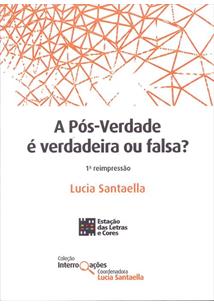Review of Santaella (2019) A pós-verdade é verdadeira ou falsa?
Abstract
In times of openness and democratization of the consumption of products, services and information through the internet, the book Is post-truth true or false? by Lucia Santaella draws our attention to the challenges of the post-truth era, giving visibility to three new words - bubbles, fake news and post-truth. The author discusses the complexity of the digital explosion that affects all human dimensions and relations of political and market interests, presenting a work divided into six chapters, addressing such metamorphosis and superficial trends in their personal, cultural and social interrelations. The author discusses in the light of the post-truth issue that education is the best barrier of protection against bubbles, fake news and other forms of ignorance in action, because it seeks in its cultural principles the veracity of facts and knowledge. The work contributes with the alert to the subjects to the blind dissemination of prejudice and violence, so that the educational processes serve to critical discernment and to guide choices through different readings of the personal and the collective, in open dialogue with democratic traditions.
Keywords
Pós-verdade, Mídias, EducaçãoReferences
Arendt, Hannah (2005). Entre o passado e o futuro. 5. ed. São Paulo: Perspectiva.
Figueira, João; Santos, Sílvio (2019). As fake news e a nova ordem (des)informativa na era da pós-verdade. Universidade de Coimbra: Imprensa da Universidade de Coimbra.
Habermas, Jürgen (1990). Pensamento Pós-Metafísico – estudos filosóficos. Rio de Janeiro: Tempo Brasileiro.
Habowski, Adilson C.; Conte, Elaine (2021). O fenômeno das fake news e a pandemia: os multiletramentos digitais em questão. Filosofia e Educação, 12(3): 1466-1496. https://doi.org/10.20396/rfe.v12i3.8661998
Ireton, Cherilyn; Posetti, Julie (2018). Jornalismo, fake news & desinformação: manual para educação. Paris: Unesco.
Kuhn, Thomas (2012). The structure of scientific revolutions. 4th.ed. United States: The Univ. of Chicago.
Morgan, Susan (2018). Fake news, disinformation, manipulation and online tactics to undermine democracy. Journal of Cyber Policy, 3(1), 39-43.
Nyhan, Brendan; Reifler, Jason (2010). When Corrections Fail: The persistence of political misperceptions. (Quando as correções falham: A persistência de equívocos políticos). Political Behavior, 32(2): 303–330.
Nikolov, Dimitar et al. (2015). Medindo bolhas sociais online. PeerJ Ciência da Computação, 1(34): 1-12.
Portella, Luiza Cesar (2022). Desinformação e democracia: um panorama jurídico eleitoral. Dissertação (Mestrado em Direito) - Universidade Federal do Paraná, Curitiba.
Santaella, Lucia (2019). A Pós-Verdade é Verdadeira ou Falsa? Barueri, SP: Estação das Letras e Cores.

Published
How to Cite
Downloads
Copyright (c) 2020 Elaine Conte, Adilson Cristiano Habowski, Natália de Borba Pugens

This work is licensed under a Creative Commons Attribution 4.0 International License.


